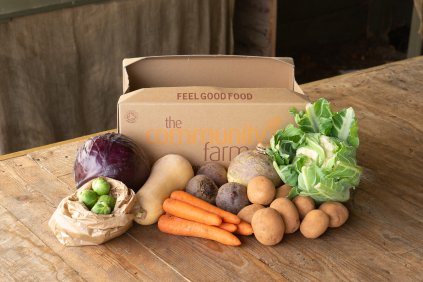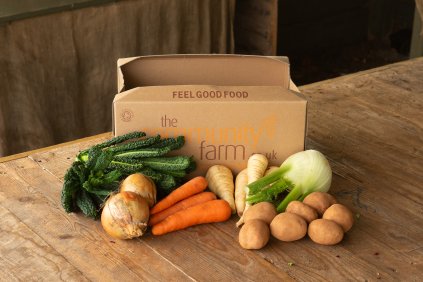Hello!
We’ve been a bit quiet lately. Not because we’re hibernating - quite the opposite!
Things have never been busier at The Farm, and we’re only just now starting to feel like we’ve managed to get a handle on the new normal that is life during lockdown.Our biggest challenge at the moment revolves around the annual phenomenon known as the hungry gap.
Managing Director Ped Asgarian has written this month's News From The Farm, in which he dishes the dirt on the dreaded hungry gap and explains how the pandemic has exacerbated its usual effect on our boxes...How is everyone? I hope you are keeping safe and looking after each other? It’s at times like these that we see the importance of strong communities and the resilience they can bring. We are doing OK at The Community Farm. It has been a tough (and dare I say exciting - you know, like, rollercoaster exciting) month for everyone involved with The Farm, which has not been helped by the anxiety and stress that the COVID-19 situation has brought with it. I must admit that I am actually pleasantly surprised by the extent that we have coped with the increase in demand. Almost overnight our vegetable box output has doubled. We’ve had to double our packing days, driving rounds and the supply coming in. But on the whole we have coped with it, and have just about got on top of the situation. Most of our normal customer service lines are open again, and we’ve managed to help provide extra employment for some that needed it. We’ve also managed to help many farmers who, in the early days, saw their wholesale market vanish overnight. We are both very thankful to our staff for all the work and extra hours they have put in to ensure demand was met, and to our customers for their patience as we have adapted to meet the changes.
On a farm the hungry gap is a beautiful time. Spring is emerging from the gloom of winter, the ground is being prepared for the coming growing season, and the noise of birdsong fills the air. However, it is a difficult time of year for providers of fruit and vegetables. Very little is coming from British fields, and the local remainder of produce stockpiled from last year’s harvest has nearly been exhausted.
This time period, therefore, always favours imports and the supermarket system of unfair fixed prices via investment in overseas farms - farms which uphold harmful farming practices and questionable human rights to meet their financial obligations.
There is no solution to it from our perspective: prices go up due to the over reliance on imported produce; small farm-based businesses struggle due to tight cashflow (high expenditure and low turnover); and quality of produce is at its annual low (as all those winter stored crops are no longer in their prime).
As a vegetable box provider, this is probably the time of year I would least want to deal with this current crisis. COVID-19 has magnified this situation by increasing demand, therefore putting extra strain on farmers to sell everything they have got. This means that prices have gone up and as the pound continues to struggle, the cost of imported produce has risen. The worrying reality is that we are potentially facing supply shortages in the coming months - especially in organic produce. The supply cannot meet the demand. Leftover winter crops are all but gone, and the current UK crops we are buying and selling were planted months ago when this demand was not present, nor foreseen. It remains to be seen how much imported produce can fill this hole as similar pressures are appearing around Europe, and, in many cases, reduced labour output due to social-distancing regulations will result in reduced supply.
Locally, food distribution and growing groups are working to acquire land that is laying dormant to put into food production, but it is unlikely that these will hit the supply chain until the latter part of the year, or perhaps not even until 2021.
It is not all doom and gloom, though. This situation has, hopefully, given many the opportunity to reflect on how lacking in resilience our current mainstream food system is. We all saw how empty the produce aisles were in March as lockdown measures began to take effect. The panic buying had a similar impact to when The Beast from the East stormed through - empty shelves supposed to be stocked with essential living items like dairy, fruits and vegetables. Yet we and other small producers and sellers that rely on small, shorter and more robust supply chains were able to continue supply.
Environmental and human rights issues aside, the supermarket supply chain is not robust enough to cope with spikes in demand; one cog goes bad and the whole system breaks down on a national level. I am not suggesting that supermarkets should not be part of a healthy food system, but I think we now have greater clarity on how their over-dominance of the sector has led to consistent issues over the last 3 years.
If we move towards systems that have more reliance on smaller, locally-based farms feeding cities and towns, we will become a healthier and more resilient society. There are several studies that show how such a system would grow stronger local economies, increase critical and quality infrastructure, improve education outcomes and, in general, make people happier!
Reducing mechanisation and creating shorter supply chains will create jobs and stop money being hoovered up by multinational corporations with no local responsibilities — and what better remedies a recession than creating jobs in a new system of circular economies?
If ever there was a time to begin this transformation of our food system, the current moment carries the most significant opportunity in over a decade. Motivated by the issues encountered during the current crisis, the upcoming changes accompanying Brexit could - if harnessed appropriately - launch a new and improved food system that benefits people and planet above and beyond profit to shareholders.














